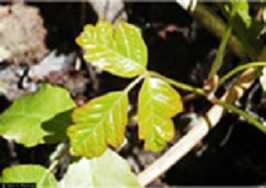POISONOUS PLANTS

Photo courtesy of U.S. Department of Agriculture
Many native and exotic plants are poisonous to humans when ingested or if there is skin contact with plant chemicals. However, the most common problems with poisonous plants arise from contact with the sap oil of several native plants that cause an allergic skin reaction—poison ivy, poison oak, and poison sumac.
Outdoor workers may be exposed to poisonous plants. Outdoor workers at risk include farmers, foresters, landscapers, groundskeepers, gardeners, painters, roofers, pavers, construction workers, laborers, mechanics, and any other workers who spend time outside. Forestry workers and firefighters who battle forest fires are at additional risk because they could potentially develop rashes and lung irritation from contact with damaged or burning poisonous plants.
Features
 NIOSH Fast Facts: Protecting Yourself from Poisonous Plants
NIOSH Fast Facts: Protecting Yourself from Poisonous Plants
Print or order this free card for easy access to important safety information.
- Page last reviewed: July 7, 2016
- Page last updated: July 7, 2016
- Content source:
- National Institute for Occupational Safety and Health Education and Information Division


 ShareCompartir
ShareCompartir